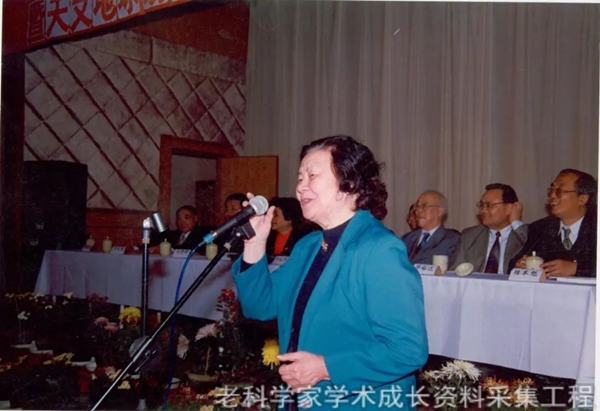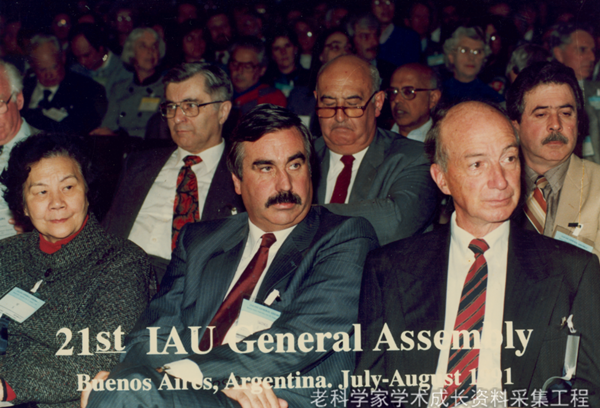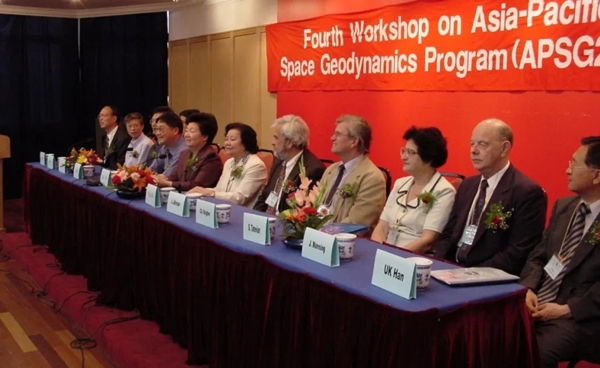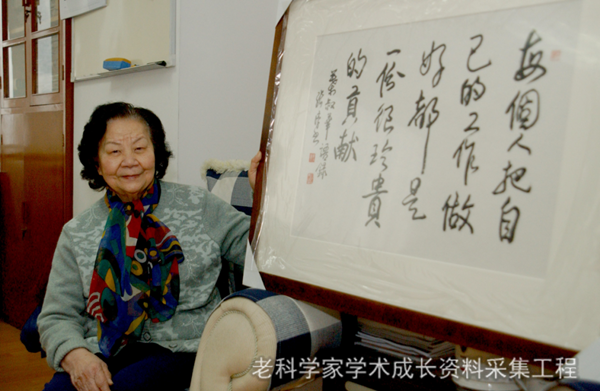Ye Shuhua: grande dame in China's astronomy world
In August 1994, the Nanjing-based Purple Mountain Observatory officially named a newly discovered asteroid "Ye Shuhua" after international organizations approved its application.
Ye Shuhua is a famous astronomer in China, an academician of the Chinese Academy of Sciences, and the first female president of an astronomical observatory in China. It is well known that Ye, dubbed the "mother of Beijing Time", presided over the establishment and development of China's comprehensive universal time system and maintained it at the advanced international level for a long time. However, few people know that she is also a scientist who vigorously advocates international cooperation and has made important contributions to international cooperation in the field of Chinese astronomy.

On November 14, 1997, Ye Shuhua delivers a speech at the naming ceremony of the asteroid named after her. [Photo/mmcs.org.cn]
Restoring the rightful seat of CAS in IAU
Ye has always stressed the importance of international cooperation. In 1978, she led delegations to visit France and the United States, during which she facilitated multiple collaborations between the California Institute of Technology and the Shanghai Astronomical Observatory.
The following year, the 17th International Astronomical Union (IAU) General Assembly was held in Montreal, Canada. Ye attended the meeting as a representative of the Chinese Astronomical Society (CAS). Thanks to the efforts of Ye and her peers in the Chinese delegation, the CAS's rightful seat in the IAU was successfully restored.
Since then, she has held positions in various professional committees of the IAU. She also served as the vice-chairwoman of the IAU Executive Committee for two consecutive tenures since 1988, greatly enhancing China's voice and influence on global astronomy.

In 1991, Ye Shuhua attends the 21st IAU General Assembly in Argentina. [Photo/mmcs.org.cn]
Taking the lead in presiding over international cooperation programs
Ye believes that China can gain more credit only by taking the lead in international cooperation programs. In the 1990s, she began to generate new research, the Asia-Pacific Space Geodynamics (APSG) Program.
The APSG program aims to use new high-precision space geodetic technologies to monitor modern crustal movements in the Asia-Pacific region and study the mechanisms of natural disasters related to crustal movements, such as earthquakes and volcanic eruptions.
Carrying out the program and driving it towards international cooperation required recognition from her international peers. Since June 1994, Ye has conducted extensive discussions and solicited opinions regarding initiating the APSG program from international academic conferences and correspondence and received positive responses and support from nearly 20 Asia-Pacific countries and regions.
That September, the UNESCAP Ministerial Conference on Space Applications for Sustainable Development in Asia and the Pacific was held in Beijing. Ye officially proposed the APSG program. But, on the day of considering resolutions before the closing ceremony, she found that her proposal was not on the resolution list.
So, Ye quickly flipped through the proposals and found one that fit her APSG program. When the chairman asked for a vote for the proposal, Ye took the initiative to make a speech, elaborating on the APSG program and suggesting adding it to the resolution list. In the end, the APSG program was listed separately as the 25th resolution of the conference.
In 1995, Ye formally proposed the APSG program to the International Union of Geodesy and Geophysics, which won the support of all parties.
In the same year, the International Association of Geodesy adopted a special resolution on the APSG program to show its support. It designated Ye to lead the project, making it the first international astronomical cooperation program chaired by a Chinese scientist.
Since launching the APSG program, China has played a central role in the project. Describing the work, Ye said: “It was the first time that China's astronomical community won a large-scale international cooperation project initiated and chaired by us. It was a challenging experience.”

Ye Shuhua attends the APSG workshop in Shanghai in 2001. [Photo/mmcs.org.cn]
Staying ambitious in her 90s today
After entering the new century, Ye continued working even in her 70s. She actively supported China's ambition to become the founding country of the world's largest telescope, the Square Kilometre Array. She also promoted the construction of the SKA Data Center in Shanghai and boosted the continuous expansion of China's astronomical observations of the moon and the universe.
On March 12, 2019, through the efforts of Ye and her peers, China, as one of the seven founding countries, ratified the Convention Establishing the SKA Observatory (SKAO). Currently, it is the largest international cooperation project in the astronomical community. The construction and operation of the SKA Data Center in China is necessary to secure China's participation in the SKA and improve scientific returns. It also supports Chinese scientists' leadership in SKA projects and is a key step for China to leap from "a follower" to "a pacemaker".
Thanks to the efforts of Ye and her peers, the Shanghai Astronomical Observatory has achieved a series of substantial results. The observatory's researchers have also successfully developed the world’s first prototype of the regional center of the square kilometer array radio telescope.

Ye Shuhua sits in the office of the Shanghai Astronomical Observatory. [Photo/mmcs.org.cn]
Today, in her 90s, the scientist who has cast her eyes on space is still ambitious. At the age of 95, she comes to work at the Shanghai Astronomical Observatory every day. She often says, "I think I am still a hard-working and daring person. I will do whatever I want to do. And everything I do, I do it for the country!"
On November 16, at the Centennial Conference of the Chinese Astronomical Society, Academician Ye was granted the society's Supreme Honor Award in recognition of her long-term outstanding contribution to China's astronomical cause.








